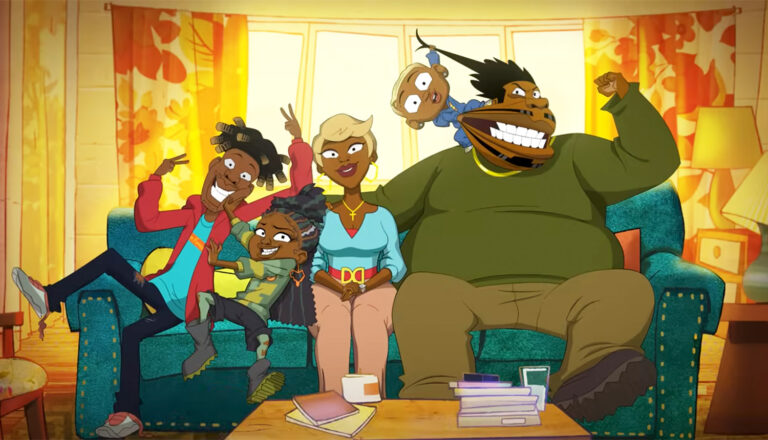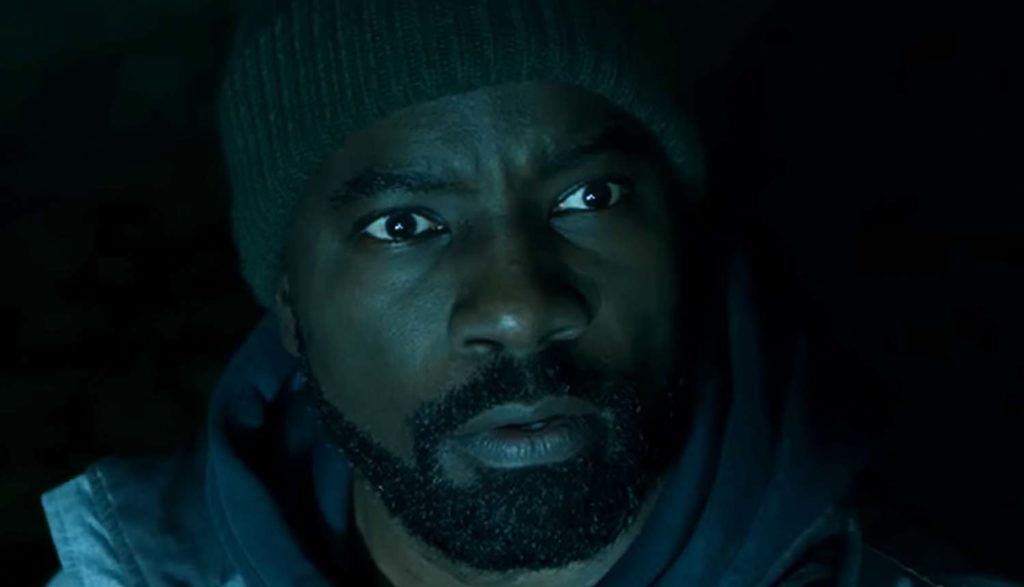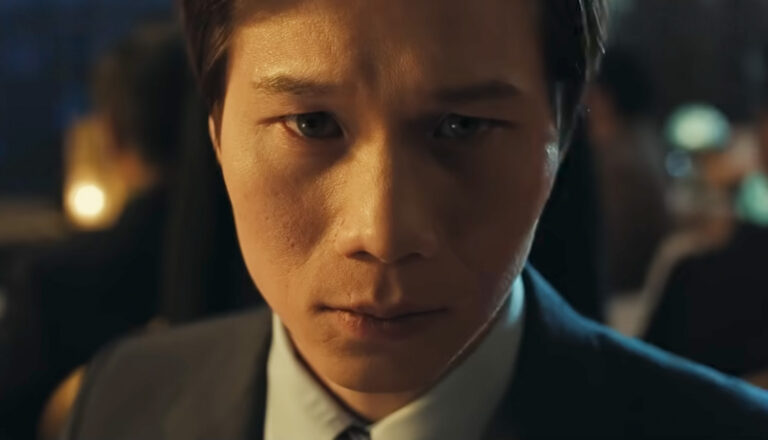
Good Times
Netflix takes a classic sitcom, Good Times, and turns it into a vulgar, violent, sexually-charged TV-MA show.

He’s a believer. She’s a skeptic. Together, they work to solve mysteries, bring evildoers to justice and, in the process, battle a shadowy, powerful organization that’s up to no good.
What, another X-Files reboot?
Not exactly. Aliens aren’t in the offing in CBS’ Evil. And our main characters work for the Catholic Church.
David Acosta is a priest in training, hired by the Vatican to cull its backlog of potentially supernatural cases. Does John Doe really need an exorcist, or just a good psychotherapist? Is this startling event really a miracle, or just a clever fraud? The Catholic Church gets, well, legions of requests for investigation and intervention, but it can’t send out fully trained exorcists to check out all of them. So David goes out in their stead to discern which cases really deserve the Church’s attention—and which should be turned over to, say, the local police.
Dr. Kristen Bouchard doesn’t buy into miracles or demonic possession. She’s a psychologist, you see, and a lapsed Catholic to boot. The only demons she’s sure about are those we manufacture ourselves. And while Kristen might seem like an odd choice to work for the Catholic Church, David relies on her expertise. “The problem with my job is that possession looks a lot like insanity,” he tells her. “And insanity looks a lot like possession.”
Kristen may not believe, in the strictest sense, but she finds the work interesting. Plus, it pays the bills. She’s got four little girls to take care of and a mountain of student loans to repay—not to mention a husband who is frequently away. She’ll take on the occasional possession case if it means she can also keep possession of her house.
The team is rounded out by an uber-scientific investigator named Ben. While David and Kristen explore a subject’s mind, Ben taps around the environment. Are those weird, whispering noises a sign of a haunting—or just faulty pipes? Ben’s the guy to ask (though, admittedly, he always thinks the answer is “the pipes”).
But while the trio may not agree on the source of these strange manifestations they investigate, they do agree what they’re fighting: evil. Pure evil, embodied (at least at first) by the oily Leland Townsend. He, along with dozens of horrible helpmates, stirs up trouble on social media and plays into the worst instincts of the society’s most vulnerable and estranged. Is he merely psychotic? Or does he answer to a more infernal boss?
By Season 3, Leland’s still hanging around and causing trouble (as any character played by Michael Emerson is wont to do). And this time, he’s picked up some predatory tendencies as well as a nasty case of cannibalism. But so far, these play as subplots to the apparent constant barrage of demonic activity plaguing our central protagonists themselves—though even those first-hand encounters won’t be enough to get Ben to believe.
While most networks run screaming from the subject of religion as if it was that little girl from The Exorcist, CBS—the same network that hit paydirt with Touched by an Angel—has shown a willingness to grapple with faith in recent years, and though it was once in a thoughtful way, Season 3 suggests that the directors have traded its respectful roots for absurd and irreverent sensationalism.
Evil, created by The Good Wife’s brain trust of Robert and Michelle King and starring Westworld’s Katja Herbers and Luke Cage’s Mike Colter, may have been its most ambitious foray into faith yet. But with its move to Paramount+ in Season 2, the show has since pushed not only pushed the envelope, but it has burned it to a crisp.
Robert King is Catholic. Wife Michelle describes herself as a secular Jew. “Our intent has always been to have religion front and center in the show. That’s the appeal of it,” Michelle told The Federalist. “The other thing that’s important to me is that we show characters with very different points of view who are willing to discuss these things and listen to each other in a respectful way. Right now, there is a lot of violent disagreement in the world and not a lot of listening with respect.”
Though the characters are indeed respectful of one another, by Season 3, the show lacks that respect for faith—particularly the Catholic Church. Naturally, the show has questionable bits of content as a result.
Whenever you’re dealing with demonic possession and exorcisms, things can take a turn to the scary … and sometimes the bloody. While not every episode features red stuff dripping and spurting about, it’s completely dependent on what supernatural mystery the team’s exploring in each given week. Sex, too, can be an uncomfortable plot point—in fact, it’s the central focus for the first episode of Season 3, where we uncomfortably watch David have sex with a demonic entity. That’s not to mention that David, in order to foster a connection with God, has been known to take psychotropic substances to, ahem, encourage visions—a practice rather outside Catholic orthodoxy. We should note, too, that Kristen flat-out murdered a guy in the first season, too (the work of her own demonic possession). Sure, the victim was a serial killer who promised to slay Kristen’s daughters, but the act still remains.
And while the first season stayed well within the limits of network broadcast standards, the second and third seasons on the streaming service Paramount+ has no such constraints. Like a possessed girl who breaks her bonds, Evil is pretty unfettered these days. Violence and gore isn’t unusual. Sexual allusions are more crass and more graphic. And as if to make sure everyone knows that Evil’s not on CBS anymore, harsher profanities—including the f-word—pop up much more frequently, sounding wholly inappropriate and vaguely ludicrous in the show’s procedural context.
Generally, evil is something you’d try to stay away from. And many folks will likely want to give Parmount+’s Evil a wide berth, too.
Though David regrets his nights of passion with Kristen, he cannot seem to stop returning to them—but a demonic revelation might change his mind. A scientific experiment regarding the weight of the soul yields confounding results.
David and Kristen kiss, moan and have sex on multiple occasions. David is seen in his underwear, and Kristen is seen in lingerie. Movements are seen, and lewd comments regarding sex and arousal are made. Kristen forces David’s hands on her breasts and genitals, and Kristen’s breasts are partially exposed.
Kristen is seen with a forked tongue, and David realizes that he’s been having sex with a demon. The demon tells David to check the catechism to see whether sleeping with a “not real” entity is forbidden.
David shatters a glass in anger and prays for forgiveness regarding his lust. Leland calls liability a “cross we all have to bear.” Kristen comments that the Roman Catholic Church “has no issues with older men touching children.” David and Kristen quote Shakespeare regarding the soul. Kristen’s husband, Andy, sees a demon, and he crushes a shrunken head to flush it down the toilet. Kristen’s mother prays to a demon.
Frank, a dying priest, asks David to forgive his sins of lust, and he doubts his faith in God. Frank comes back to life after briefly dying, and David later theorizes that a demon left Frank and entered into another dead woman. Later, that dead woman is seen watching David having sex with a demon. Frank kisses a male priest on the lips after coming back to life, and he mentions that he always wanted to do that.
An online user says that he puts medicine in his mom’s food as a prank to see if she reacts. A man opens a book titled “The Pop-Up Book of Contemporary Demons.” In the book, a demon cuts off paper human heads, and naked paper people are seen being tortured in hell, though nothing is shown.
A nun explains that faith, not works, will save a man. Kristen’s mother has a glass of wine. A bloody ice pick is seen in the intro sequence.
We hear eight f-words, one of which is preceded by “mother.” The s-word is used twice, and a rude word for male genitalia is used. We also hear instances of “h—” and “a–.” God’s name is misused ten times, one of which is in the form of “g-dd–n.” Jesus’ name is inappropriately used twice.
David is two months from becoming a full-fledged priest. Kristen is grappling with the aftermath of the murder she committed. But they’ve still got jobs to do for the Catholic Church. And this time, the Church has a doozy for them: Leland Townsend—the duo’s primary adversary in Season 1—wants them to perform an exorcism on him.
The reason Leland proffers is his impending marriage to Kristen’s mother. “I want no roadblocks to our future happiness,” he says. And he adds with a knowing grin, “I still have certain dark moments.” David, Kristen and their tech expert Ben believe they’re all being played, but they play along. “Let’s con him back,” Ben suggests.
We see and hear plenty of evidence of Leland’s links with the infernal. They include props he left in his apartment to goad the investigators, such as the book on his nightstand (the Donald Trump-centric Devil’s Bargain) and his computer password (“Lucifer8”). An upside-down cross hanging in Leland’s pad falls and reveals a secret that debunks supposedly infernal evidence.
Leland claims he sold his soul to the devil when he was in high school, says he prays to “my father below” and belittles Christianity. “Did you know that Christianity is the only religion that prays to a criminal?” When investigators expose some of his lies, Leland responds, “Of course I lied. I’m possessed!”
But they have no explanation regarding why Leland’s first wife (who informs on him) mysteriously suffers a near-fatal accident. And demonic influence seems to be all around the team. Kristen—perhaps because of the murder, the show suggests—suffers a burn from a rosary cross. (She calls it a rash, and Ben comes up with a more rational explanation.) David has a vision of Kristen walking toward a goat-headed demon who’s threshing wheat with a scythe as Leland dances to the disco tune “Funkytown.” Most disturbingly, Ben has a nightmare/vision of a female demon coming to him in the night. She tells him that she likes male nipples, magically lifts up his shirt, asks if he remembers their “safe word” and then seems to bite into Ben’s chest as Ben he up with a start. (Leland predicted that Ben would have disturbing dreams soon.)
Kristen’s daughter—who was conceived with the help of a potentially diabolical fertility institute—has some super-sharp incisors growing in her mouth. Kristen finds their home’s floors and walls stained with blood (because of the painful tooth problem). They go to a dentist to have the teeth removed. But while the girl is under general anesthesia, she suddenly bites down on the dentist’s hand. We see the dentist’s nearly severed finger lolling about on the stump amid a jet of blood. (The girl wakes up and doesn’t seem to remember a thing.)
David takes off his shirt, revealing a nasty looking wound on his stomach, and presses an alcohol-soaked cloth into the injury—causing him to faint from the pain. Kristen wipes blood off a pick she used to kill the serial killer, then sanitizes and hides it. She buries other evidence in her back yard, it would seem (avoiding curious questions from her children), and she confesses the deed to her own psychologist.
Leland describes the devil as a seven-foot-tall thing with the head of a goat—mirroring drawings that lie around David’s apartment. There’s a suggestion that Leland is trying to use the Catholic Church for his own infernal ends. Kristen tells Ben to illegally spy on Leland through a webcam. We hear about the horrific death of a bus driver. Characters use the f-word three times. The profanity count is otherwise pretty light, with “a–,” “b–ch” and “d–n” used once apiece and “h—” used twice. God’s name is misused five times.
In the season finale, David and Kristen try to help a woman who believes that her unborn baby is possessed, and David makes a frightening connection with a fertility clinic. Meanwhile, a serial killer whom Kristen helped convict, but whose conviction was later overturned, stalks Kristen and her four daughters. His continued presence in their lives perhaps forces Kristen do something … drastic.
The pregnant woman, who’s carrying twins, suffers mightily from one of her unborn children. We see the unusual fetus move violently beneath the woman’s skin, and the would-be mother complains that the baby is eating her from the inside. During Mass, after she swallows the bread, she falls screaming to the floor as a massive pool of blood forms around her. Later, at the hospital, doctors discover that one of the twins is gone. David argues with a priest as to whether a fetus could be possessed (and how that factors into the immorality of abortion).
The killer, named Orson, claims that he’s a Christian now and is trying to make amends. It’s a lie, of course. He calls her up and apologizes for wanting to do terrible things to her and her daughters—describing his fantasies in detail. (They include “snapping the necks” of the girls and dismembering Kristen with a shovel.) Toward the end of the episode, Kristen eyes a mountaineering pick. Then, in a later scene, she wipes blood from her leg. (We later hear that Orson was killed—apparently bludgeoned to death.)
In dreams, Kristen hits Orson with a chair and stabs a demon in the back with a pair of scissors. A bipedal goat creature, representing Satan himself, haunts her dreams as well, and one of her children (either in a dream or a facsimile of real life) opens a door for him as he tells the girl that he’s there to take her to “the next level.” David also dreams of the devil-creature, harvesting grain with a huge scythe.
We hear a few quotations from Scripture and a prayer. A fetus seems to react to prayer angrily. A woman’s hand is burned when holding a crucifix. We see an exorcism and hear plenty of talk of its merits (or, from unbelievers, the lack thereof). Someone jokes about how much blood is in Christianity when a woman tells him that the eucharistic host was supposed to bleed.
There’s some talk about a man “touching himself” while looking at girls. People drink wine. Characters say “d–n” twice and misuse God’s name about four times.
A serial killer named Orson is awaiting trial for his crimes. And while Orson claims to have blacked out during his horrific deeds, and some believe that he was possessed, Bouchard—currently an expert witness for the prosecution—is positive the guy knew exactly what he was doing. Or, at least, she was. But that was before she said the Lord’s Prayer in his presence (an intentional provocation which prompted him to attack her, shouting in Latin all the while).
Bouchard partners with Acosta, who has been hired by the Catholic Church, to see if Orson is truly possessed or merely psychotic. But as they begin to unravel the mystery, an apparent demon starts visiting Bouchard in her bedroom. And he’s certainly not there for tea and crumpets.
On his first visit, the demon (named George), crawls underneath Bouchard’s covers, asks if her new panties are for her “new boss” (Acosta) and talks about her Cesarian scar. (Though we don’t see exactly what the demon’s doing, we later hear that George took off her panties and sucked on the scar.) He urinates in the corner of Bouchard’s bedroom (Bouchard later dismisses the damp puddle as the result of an open window). The next night, He takes a knife to her hand—forcing her to answer a series of deeply personal yes or no questions (including whether she’s sexually attracted to Acosta). Lies cause the demon to cut her hand (which he does, sending blood dribbling down) or lop off a finger (which he does, laying the severed pinkie on her neck.)
Bouchard thinks the first visitation was a night terror accompanied by sleep paralysis, while the second was clearly a dream (since she still has her pinkie). But conversations with Roy, which indicate he knew about the visitations, suggest there’s something else at work.
We hear a lot of talk about demonic possession and other spiritual elements. Crucifixes are wielded, crosses are drawn, and prayers are uttered. We see flashes of Orson’s despicable deeds, including him drawing a knife across someone’s throat. We also hear the screams of another victim as she struggles. We’re told that he killed several people and raped someone, too. To provoke Orson, Bouchard asks him to answer yes or no to the question, “I like the sound of a woman screaming.”
Orson grabs Bouchard, inflicting bad-looking bruises on her arm. Someone is hit repeatedly with a baton. Bouchard’s mother bad-mouths Bouchard’s absent husband. Two men get into a fistfight. A demon apparently threatens Bouchard’s four daughters. Someone asks Acosta (who’s training to be a priest) why he’s not raping altar boys at the moment.
When demonic whispering proves to be just the sound of clogged pipes, the homeowner is clearly disappointed. “You killed Santa Claus for her,” Bouchard tells the investigator who made the discovery. We hear about the corrosive, sometimes evil effect that social media has on some people, including a reference to necrophilia. We see some graphic photos of dead bodies.
A couple of people drink margaritas. We hear two uses of the word “b–ch” and one misuse of God’s name.


Kennedy Unthank studied journalism at the University of Missouri. He knew he wanted to write for a living when he won a contest for “best fantasy story” while in the 4th grade. What he didn’t know at the time, however, was that he was the only person to submit a story. Regardless, the seed was planted. Kennedy collects and plays board games in his free time, and he loves to talk about biblical apologetics. He thinks the ending of Lost “wasn’t that bad.”

Paul Asay has been part of the Plugged In staff since 2007, watching and reviewing roughly 15 quintillion movies and television shows. He’s written for a number of other publications, too, including Time, The Washington Post and Christianity Today. The author of several books, Paul loves to find spirituality in unexpected places, including popular entertainment, and he loves all things superhero. His vices include James Bond films, Mountain Dew and terrible B-grade movies. He’s married, has two children and a neurotic dog, runs marathons on occasion and hopes to someday own his own tuxedo. Feel free to follow him on Twitter @AsayPaul.

Netflix takes a classic sitcom, Good Times, and turns it into a vulgar, violent, sexually-charged TV-MA show.

While its protagonist might live a nuanced life, The Sympathizer’s problematic content can’t be described the same way.

Say hola once again to the iconic explorer in this faithful reboot of the children’s series.

Based on a popular video game, Ark: The Animated Series features hungry dinosaurs, bloodthirsty people and plenty of problems.